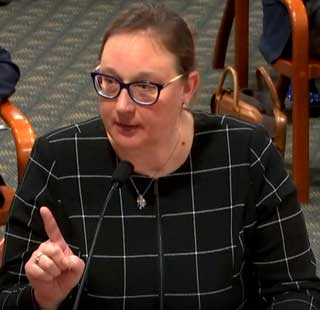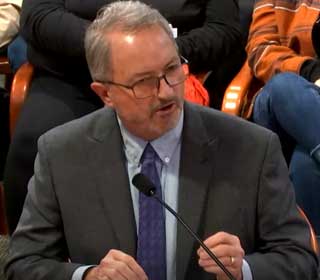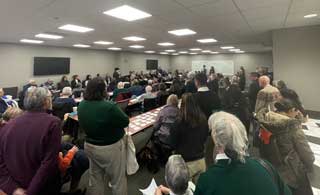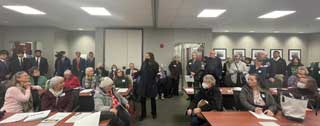Lansing Update: MCC Active on Three High-Profile Legislative Issues This Week
Posted March 3, 2023
In this update:
- Catholic Conference Active on Three High-Profile Legislative Issues This Week
- Senate Fails to Include Religious Protections in Civil Rights Bill
- MCC Testifies for Protecting Full-Term Babies from Abortions
- Violence in Society Noted as Underlying Issue in MCC’s Testimony for Gun Reforms
- Hundreds of Catholics Meet with Lawmakers to Support Driver’s Licenses for Immigrants
Catholic Conference Active on Three High-Profile Legislative Issues This Week
This week saw Michigan Catholic Conference (MCC) engaged on three separate, high-profile legislative issues of importance: religious liberty, abortion, and gun safety reforms. More information on what happened follows below, but in brief:
- The state Senate voted to advance a civil rights bill without protections for faith-based people and organizations that MCC has been urging lawmakers to include.
- MCC testified against bills to remove the state’s long-standing law protecting women and children from abortion. Matching bills moved out of Senate and House committees, and some of the House bills were then approved by the full House.
- MCC testified in support of gun safety reforms being considered before a House committee. The committee did not move the bills.
Senate Fails to Include Religious Protections in Civil Rights Bill
Despite weeks of advocacy from MCC and other faith-based groups, as well as more than 7,000 messages from grassroots Catholics, the Michigan Senate this week voted for legislation that adds new categories to the state’s civil rights law, but without an amendment that protects religious organizations from discrimination.
MCC and others have urged Senate members to protect religious organizations from discrimination claims and litigation when adding sexual orientation and gender identity and expression to the Elliott-Larsen Civil Rights Act (ELCRA).
However, the Senate opted not to include religious protections when it voted 23-15 on Senate Bill 4, sponsored by Sen. Jeremy Moss (D-Southfield). All Democrats voted for the bill, along with three Republicans.
“We’re disappointed that members of the Senate voted today to deny constitutional rights and protections to religious organizations that hold long-standing beliefs about marriage that differs from the secular culture,” said Tom Hickson, MCC Vice President for Public Policy and Advocacy, in a statement MCC released Wednesday. “By failing to strike a balance and voting against amendments to ensure religious organizations are not targeted for their long-standing religious beliefs about marriage and gender differences, the Senate has signed off on creating a class of citizens against which discrimination and targeted litigation will be likely.”
MCC believes that failing to include religious protections in Senate Bill 4 will:
- Lead to a new class of discrimination against people of faith,
- Encourage targeting of faith-based social service, educational, and charitable organizations, and
- Force small non-profit/religious organizations into lengthy litigation in state courts.
As Senate Bill 4 heads to the House for consideration, MCC will continue to advocate for religious protections considering every state in the country that has amended its civil rights law has included religious protections.
Meanwhile, more than 7,000 messages have been sent to elected officials in Lansing from grassroots Catholics and other Michigan residents urging protections for religious organizations so they may continue to serve others without concern for being taken to court for exercising their beliefs in public. To continue to urge House members to consider these religious protections, click or tap here to contact your representative.
MCC has been joined in its advocacy efforts by the Council on American-Islamic Relations Michigan Chapter, Citizens for Traditional Values, and the Michigan Association of Nonpublic Schools.
The campaign to include religious protections in the legislation has been chronicled in the Detroit News, Detroit Free Press, and Detroit Catholic. MCC staff have also given several radio interviews on the issue over the past few weeks.
MCC Testifies for Protecting Full-Term Babies from Abortions
MCC stood for supporting mothers in difficult pregnancies and for protecting full-term babies from abortion in testimony this week against bills that would remove Michigan’s long-standing law protecting woman and children from abortion.
House and Senate committees this week each voted to advance similar bills intended to repeal Michigan’s 1931 law that prohibits abortion except to save the mother’s life. The full House then voted the next day to advance its version of the bills to the Senate, with all Democrats voting for the legislation and most Republicans voting against it.
MCC argued to House and Senate members that the 1931 law still retains a limited purpose, despite the passage of Proposal 3 this past fall which created a state constitutional right to abortion. Because the new constitutional amendment allows the Legislature to regulate abortions after the point of fetal viability, repealing the 1931 law could create a gap in state law allowing late-term abortions.

“Remaining in statute, the 1931 law may serve to stand in this gap—limiting post viability abortions on healthy women,” said Rebecca Mastee, policy advocate for MCC, in her testimony. “To what extent the statute could be enforced within these limited parameters will remain to be seen, but what does our law say without it?”
Mastee’s testimony to the House Judiciary Committee as well as the Senate Health Policy Committee also encouraged lawmakers to work toward supporting women and families throughout their pregnancies and beyond.
“What does it say when our society promotes abortion as the solution to unplanned, unexpected, or challenging pregnancies? To those who say some women need abortion to be available—especially women with fewer economic means or opportunities—I ask, what if she were supported?” Mastee said.
Unfortunately, both the House and Senate committees voted to advance the bills to their respective chamber floors with Democrats in favor and Republicans opposed.
In the House committee, MCC was the only organization permitted to testify that provided a pro-life perspective on the legislation. And while Democrats on the committee voted for the bills, at least two – House Judiciary Chair Kelly Breen (D-Novi) and Rep. Emily Dievendorf (D-Lansing)—both said they agreed with what MCC said about supporting women and families with more resources.
The bills in the House are House Bills 4006, 4031, and 4032, although only House Bills 4006 and 4032 were approved by the full House. The bills in the Senate are Senate Bills 2, 37, 38, 39, and 93.
While the package of bills has been referenced as merely removing the 1931 ban on abortion, concerns have been raised in both testimony and by Republicans about Senate Bill 37 and House Bill 4032 because those bills remove penalties in law for performing an abortion that results in the death of a woman.
In the House Judiciary Committee, Republicans unsuccessfully tried to tie the repeal legislation to bills they sponsored that are intended to ensure common-sense safeguards around the practice of abortion.
Those safeguard bills included prohibiting abortion for the purposes of sex-selection or because the baby has been found to have Down’s syndrome, as well as barring non-physicians like dermatologists and dentists from administering abortions.
Another bill would also have clarified that “extraordinary medical measures” do not include therapies commonly used by neonatal intensive care units supporting premature babies. This was proposed because the new amendment only allows the state to regulate abortions after fetal viability and any baby who may require extraordinary medical measures could be considered not viable, based on the definition of fetal viability in the amendment.
Democrats voted against all these measures. Republicans tried similar amendments on the House floor, but those amendments were not adopted.
Violence in Society Noted as Underlying Issue in MCC’s Testimony for Gun Reforms
Legislation to implement gun safety reforms were supported this week by MCC as “steps on a journey toward a culture that values life, recognizes and includes the isolated among us, and seeks to bring safety to our communities,” according to MCC testimony delivered to a House committee.
MCC testified in favor of legislation in the House that would require gun owners to safely store their guns at home, expand background check requirements on gun purchases, and implement extreme protection orders intended to temporarily remove guns from people who may pose a threat to themselves or others.
However, in testimony delivered to the House Judiciary Committee, policy advocate Paul Stankewitz noted MCC’s support for the bills stem from MCC’s opposition to violence in society because of its threat to human life.
“We need to begin taking policy actions, as a society, in a coherent, holistic manner to embrace and foster a culture of life,” Stankewitz told the committee. “We need to face facts, that gun violence, be it homicide or suicide, is a burden upon our society, devalues life, and is degrading our culture.”

Stankewitz noted that this is not just about the shooting that took place at Michigan State University last month, or at Oxford High School in 2021, but also “about what happens on our urban streets, in our small towns, and in homes across our state, each and every week.”
MCC urged lawmakers to go beyond the policies before the committee to implement a public awareness campaign so that gun owners are aware that they need to secure their guns safely or face penalties. MCC also called for greater attentiveness to, and awareness of those who feel alienated or isolated from society, as well as for meeting the mental health needs of people.
The bills MCC spoke in support of were to expand gun background checks, require safe storage of guns and implement extreme protection orders (EPO). The bills in the House are House Bills 4138 through 4148, and in the Senate, they are Senate Bills 76 through 86.
For background checks, the legislation would expand Michigan’s background check law to include all firearms, not just pistols. They would also adjust the Michigan Penal Code and sentencing guidelines for violations.
On safe storage, the bills would require the safe storage of firearms that could be accessible by minors, create sentencing guidelines for violations, exempt storage devices and gun locks from sales/use taxes, and require signage at the point of sale regarding the tax exemption.
And for the EPO legislation, the bills would allow for the temporary confiscation of firearms from individuals deemed by a court process to be a danger to themselves or others. The bills would prohibit an individual under an EPO from purchasing firearms and establish sentencing guidelines for violations of an EPO or making false statements when petitioning the court for an EPO.
Both the House and the Senate took testimony only this week on the bills. MCC was scheduled to address the Senate committee this week as well but MCC’s testimony was rescheduled to next week due to the number of speakers that presented.
Hundreds of Catholics Meet with Lawmakers to Support Driver’s Licenses for Immigrants
Nearly 170 Catholics from across Michigan met with their state representatives in Lansing this week as part of a coordinated push for legislation to allow immigrants and refugees to obtain driver’s licenses regardless of their immigration status.
Strangers No Longer is the Catholic grassroots group that organized the legislative visits, as nearly 170 Catholics participated in meetings with close to 70 legislators or their staff, with information ultimately left with the offices of every House and Senate member.

The visits were intended to advocate for the Drive SAFE bills, which would allow undocumented immigrants or refugees to obtain driver’s licenses so they can safely and legally drive, which is crucial for getting themselves to work or their kids to school. The legislation would restore the ability for all Michigan residents to obtain driver’s licenses, something that was possible before that was eliminated in 2008.
“The driver’s license … without that, you don’t exist in Michigan,” said Bill O’Brien, executive director of Strangers No Longer, the Detroit-based nonprofit that consists of a network of circles of support in Catholic parishes, congregations, and immigrant communities that support immigrants and advocates for comprehensive and humane immigration policy. Strangers No Longer is named after the pastoral letter authored by the U.S. and Mexican bishops on immigration.
MCC has worked with Strangers No Longer in advocating for the Drive SAFE bills, as MCC staff has spoken at the group’s recent conference and addressed the advocates before their Capitol visits this week. MCC has long supported the driver’s license legislation as a matter of extending basic human dignity to immigrants and refugees.
The legislation has been introduced over multiple legislative sessions but has not yet advanced to become law. MCC highlighted the Drive SAFE legislation as a priority for this session when it released its Blueprint for the Common Good recently.
Before the advocates departed for their meetings, Senators Stephanie Chang (D-Detroit) and Mary Cavanagh (D-Redford Twp.) addressed them in person and shared their support for advancing the legislation. Sen. Jeff Irwin (D-Ann Arbor) sponsored the group’s meeting space in the Senate building and formally introduced the group from the Senate floor during session.

Besides advocates from parishes spanning from southeast Michigan to Grand Rapids to Traverse City, there were also students present from Shrine Catholic High School in Royal Oak, Detroit Cristo Rey High School, and Brother Rice High School in Bloomfield Hills. Sisters from the Adrian Dominicans community as well as the Religious Sisters of Mercy took part in the visits.
Jim Russo from St. Francis of Assisi parish in Ann Arbor shared with MCC that he took part in the Strangers No Longer advocacy day at the Capitol because he personally knows an immigrant family consisting of a mother and five kids who cannot obtain a driver’s license.
“She’s totally dependent on others for rides, and to arrange jobs for her, so it makes it really hard for her to get along,” Russo said. “If she could get a driver’s license, she could become more independent and support herself and her family.”
